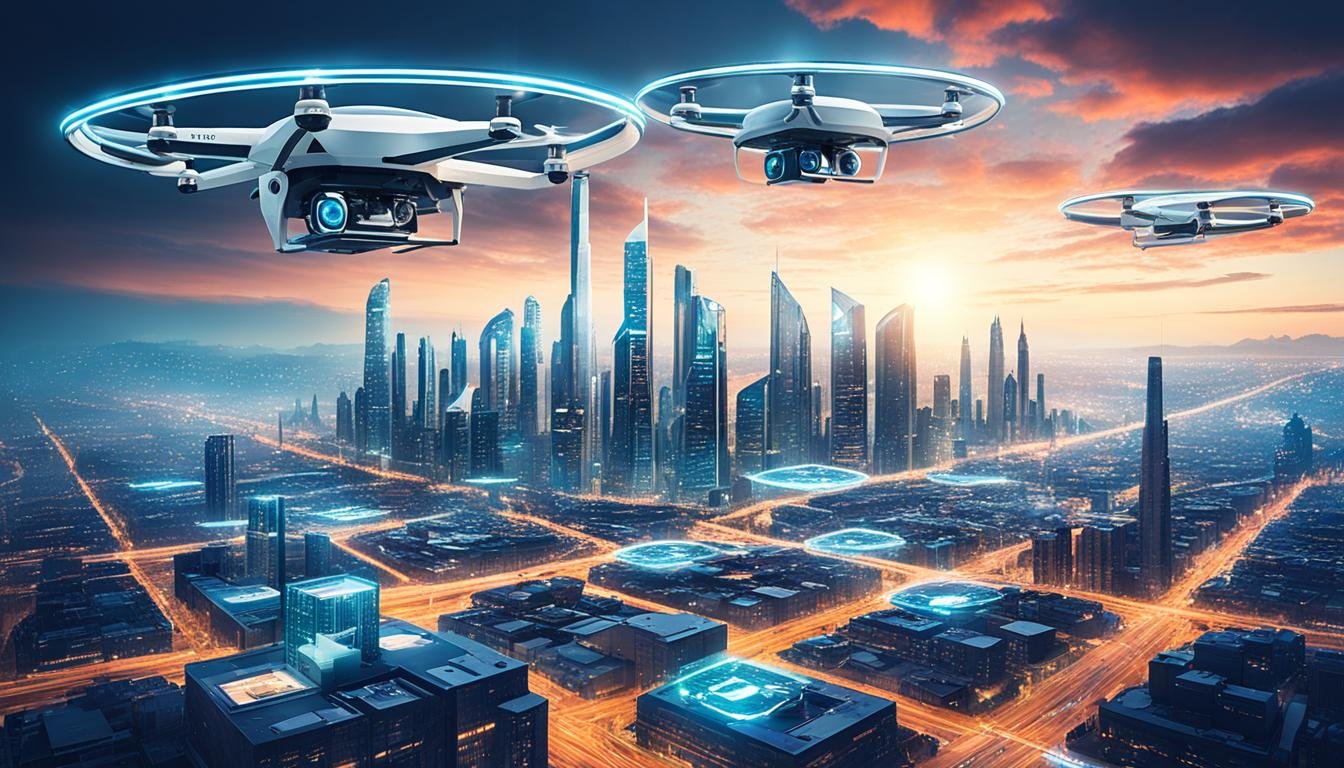Did you know that machine learning (ML), a part of artificial intelligence (AI), is widely used in business today? This fact shows how AI is becoming a big deal in the corporate world. Companies from all kinds of industries are using AI to innovate, work better, and stay ahead.
This article will look at how AI is changing different industries. We’ll talk about the tech behind it, its real-world uses, and what the future holds. By learning about AI’s impact, you’ll be ready to take on the new chances and challenges it brings.
Key Takeaways
- AI is becoming a key tool for businesses, affecting many industries.
- Machine learning and deep learning are leading AI technologies changing how businesses work.
- AI is making decisions better, improving data analysis, cybersecurity, and customer service, among other things.
- AI is changing industries like healthcare, finance, retail, manufacturing, transportation, and education.
- The future of AI in business looks like it will handle more daily tasks and make the impossible possible.
Introduction to AI in Business
Artificial Intelligence (AI) is changing how businesses work across many industries. It helps improve customer experiences and make internal processes smoother. Companies are quickly adding AI to stay ahead in the market.
Understanding AI and its role in business is key. It’s becoming a must-have for companies looking to grow.
What is AI?
AI means computer software and systems that can do tasks that need human smarts, like learning and solving problems. It uses advanced algorithms and learning methods to look at lots of data. This helps automate tasks and make better decisions.
AI’s Prevalence in Business
Since 2017, the use of AI in business has doubled, says a McKinsey & Company study. This growth is because AI can bring big value, with 63% of those surveyed planning to spend more on AI in the next three years. AI is making a big difference, like saving $80 million for a South American telecommunications company by focusing on high-value clients with AI.
The AI market is expected to grow by 40.2% a year from 2021 to 2028, reaching $62 billion in 2020. This makes AI key for businesses wanting to stay competitive. More companies are using AI, with 56% of those in McKinsey’s “The state of AI in 2021” survey adopting it, up from 50% the year before.
“84% of C-suite executives believe leveraging AI will assist them in achieving their growth objectives,” as reported by Accenture.
The huge increase in data, which grew by 5000% between 2010 and 2020, has pushed more companies to use AI. AI is now crucial for businesses to make sense of this data. It helps them get insights, automate tasks, and make better decisions.
Machine Learning and Deep Learning
The world of artificial intelligence is growing fast. Two key technologies, machine learning and deep learning, are leading the way. They help enterprises use AI business applications to understand big data. This lets them make smarter, data-based choices.
Machine Learning Explained
Machine learning (ML) is a type of AI that gets better over time. It uses algorithms that learn from more data. This makes it great for corporate AI adoption and artificial intelligence in industry.
Deep Learning and Neural Networks
Deep learning is a step up from ML. It uses artificial neural networks for complex thinking. This is key for tasks like spotting fraud. Deep learning gets better with more data, making it scalable and detailed. It’s vital for business AI solutions and ai for enterprises.
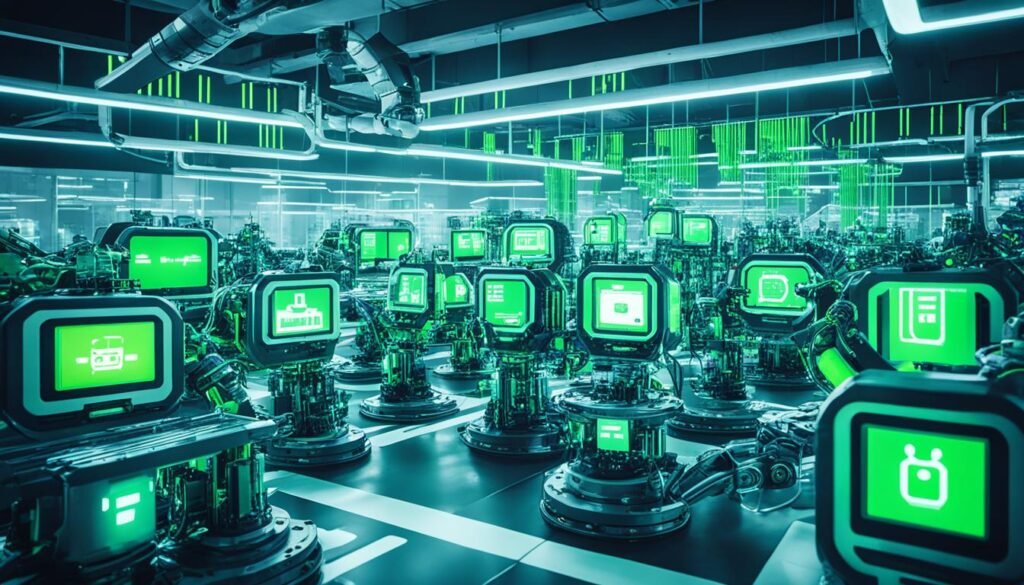
“Organizations utilizing AI and ML achieve faster processing of complex data, enabling better-informed, data-driven decisions.”
Using machine learning and deep learning in ai business applications opens new doors for businesses. It helps them work better, improve customer experiences, and stay ahead in the market. As artificial intelligence in industry grows, these technologies will shape the future of corporate AI adoption.
How AI is Transforming Business Operations
Artificial intelligence (AI) is changing how businesses work. It brings new chances for making things better and making smart choices. AI can look at huge amounts of data faster than people, finding important insights and suggesting what to do next.
AI’s Role in Decision-Making
AI is not here to replace human smarts; it’s a big help. It’s great at handling lots of data to find possible solutions. This helps businesses make choices based on data, making things run smoother and grow.
“Artificial intelligence is kind of the second coming of software,” explained Amir Husain, founder of ML company SparkCognition. “It’s a form of software that makes decisions on its own, that’s able to act even in situations not foreseen by the programmers. Artificial intelligence has a wider latitude of decision-making ability [than] traditional software.”
The AI market is expected to be worth over $500 billion by 2024. This shows how big its impact is across different industries. From how AI is used in business to AI-powered business processes, it’s changing how companies work and make choices. As AI for business optimization gets better, companies that use it will get ahead.
AI Applications in Business
Today, businesses are using artificial intelligence (AI) to make things more efficient and improve customer experiences. AI helps them stay ahead of the competition. It’s used for everything from analyzing data to keeping networks safe.
Machine Learning for Data Analysis
Machine learning (ML) is a key part of AI that helps businesses find important information in big data sets. It looks at past data to spot patterns and make predictions. This helps companies make better decisions.
For example, ML is used in smart energy systems. These systems learn how energy is used and when it needs maintenance. This helps companies save energy and money.
AI in Cybersecurity
AI is a big help in fighting cyber threats. It watches for patterns in data to catch and stop cyberattacks. If it finds a threat, it can trace it back to its source to prevent more attacks.
Now, over half of businesses use AI for cybersecurity. This shows how important it is for protecting important business data.
| AI Application | Percentage of Businesses Adopting |
|---|---|
| Cybersecurity and Fraud Management | 51% |
| Customer Service (Chatbots and Virtual Assistants) | 56% |
| Customer Relationship Management (CRM) | 46% |
| Digital Personal Assistants | 47% |
| Inventory Management | 40% |
| Content Production | 35% |
As businesses keep using business ai solutions, artificial intelligence in industry, and ai-driven business strategies, the chances to use enterprise ai implementation will grow. This will change how companies work and compete today.
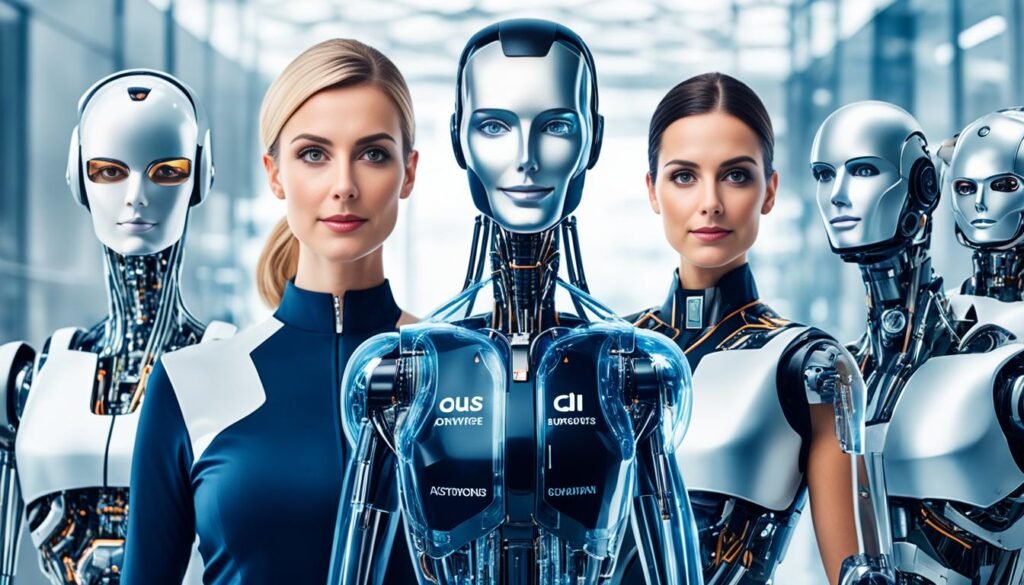
Customer Relationship Management with AI
Artificial Intelligence (AI) is changing how businesses handle their customer relationships. AI-powered CRM systems are making it easier for companies to connect with their customers. This leads to better, more tailored service for everyone.
TD Bank and Flybits, an AI company, are a great example of this. They’ve teamed up to offer personalized messages and deals to customers. For example, if a customer is about to renew their mortgage, they might get a special invite to do it at a nearby branch. Or, if someone is looking at properties, the system can offer a mortgage deal just for them.
AI isn’t just for banks, though. Companies like Nutshell, Salesforce, HubSpot, Zoho, Freshworks, and Pipedrive are adding AI to their CRM tools. These tools help with sending emails, understanding customer accounts, talking to customers, turning leads into sales, and predicting when deals will close.
A SugarCRM report found that AI is most used in CRM for sending automated emails, understanding customer accounts, talking to customers, turning leads into sales, and predicting deal closings. AI helps businesses answer customer questions faster, give better answers, and automate tasks. This makes customers happier.
| CRM Provider | AI-Powered Features |
|---|---|
| Nutshell | Power AI plan for automation and insights |
| Salesforce | Einstein GPT for AI-generated content, AI Cloud for better functionality |
| HubSpot | ChatSpot for conversational AI |
| Zoho | Zia AI assistant for customer interactions |
| Freshworks | Freddy AI for customer interactions |
| Pipedrive | Sales Assistant for sales process optimization |
The use of business ai solutions, enterprise ai implementation, and ai-powered business processes in CRM is becoming more common. As AI gets better, businesses will see even more ways to manage customer relationships well.
how ai used in business
Artificial Intelligence (AI) is changing how businesses work in many industries. It helps with data research and makes customer service better. Let’s look at some key areas where AI is used in business.
Internet and Data Research
AI changes online data research a lot. It goes through lots of data to find patterns and give users better info. “We’re no longer expecting the user to constantly be on a search box Googling what they need,” says Rahnama. “The paradigm is shifting as to how the right information finds the right user at the right time.”
AI business applications in this area help companies know their audience better. They can make their content and services more relevant.
Digital Personal Assistants
AI also changes how businesses work from the inside with AI chatbots. These chatbots help with emails, calendars, and give tips to make things run smoother. By giving these tasks to chatbots, businesses can improve customer service. They also get more time to think about growing their company.
This use of AI for enterprises makes businesses more productive and efficient.
As business AI solutions get better, companies that use these technologies will lead the way. They will offer great value to their customers. By using AI, businesses can find new ways to grow and innovate.
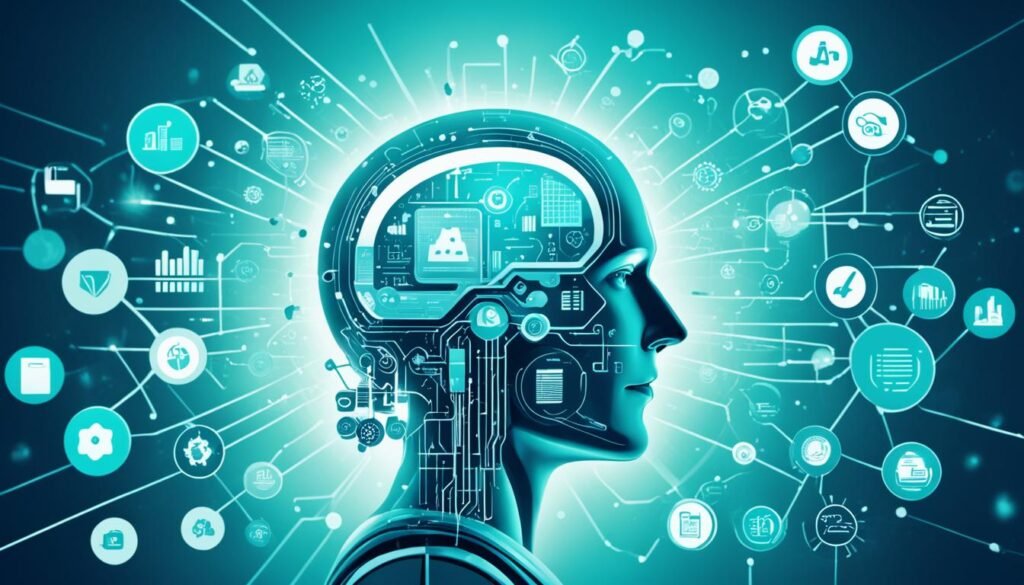
| AI Application | Benefits | Examples |
|---|---|---|
| Internet and Data Research | Improved user experience, better-targeted content and services | Google, Amazon, and Netflix recommendations |
| Digital Personal Assistants | Increased productivity, enhanced customer service | AI-powered chatbots for email management and process optimization |
The Future of AI in Business
AI technology is getting better and will soon handle many everyday tasks. Robots and smart systems will become a big part of our lives. They will automate and improve many business tasks. Russell Glenister, CEO and founder of Curation Zone, says, “AI is starting to make what was once considered impossible possible, like driverless cars.”
AI’s growth comes from lots of training data and powerful computers, like GPUs. These tools help bring AI into more industries. Dr. Nathan Wilson, co-founder and chief technology officer of Nara Logics, thinks AI could even pick music for a restaurant or change the wallpaper based on what guests like.
AI Handling Everyday Tasks
The future of ai for business optimization looks exciting. It will automate routine tasks and improve decision-making. AI-powered business processes are changing how companies work. Experts see a future where how ai used in business will fit into our daily lives easily, making tasks simpler and opening up new possibilities for ai business applications.
Making the Impossible Possible
AI technology is bringing us closer to amazing innovations we once thought were impossible. Driverless cars are now real thanks to lots of data and powerful computers. As AI keeps getting better, what’s possible and what’s not will keep changing. This opens up new chances for businesses to grow and succeed.
“AI is starting to make what was once considered impossible possible, like driverless cars.”
AI’s Impact on the Workforce
As artificial intelligence in industry changes many sectors, there are worries about automation replacing human jobs. But, we don’t know for sure how big of an impact AI will have on the workforce. Some experts think AI will lead to many job losses. Others believe it will bring new jobs that work well with human skills.
AI is making a mark in human resources and talent management. 40% of HR functions in companies big and small are now using AI-augmented apps. These tools help make better decisions, tailor talent development, and cut down on hiring biases.
Also, 32% of tech companies and others are using AI to change their organizations for better adaptability and learning. This change is likely to grow as more companies use ai-driven business strategies in their work.
| AI Applications in HR | Percentage of Companies Utilizing |
|---|---|
| People analytics | 71% |
| AI-powered job interviews | Over 600 companies |
| Human capital management | Half of CHROs anticipate potential |
As more companies use enterprise ai, the future of work will keep changing. Some jobs might disappear, but AI could also create new ones and improve human skills. Companies need to use AI wisely to stay ahead and make sure it helps workers and the economy grow together.
“AI could increase labor productivity growth by 1.5 percentage points over the next ten years, and globally, AI-driven growth could be nearly 25% higher than automation without AI.”
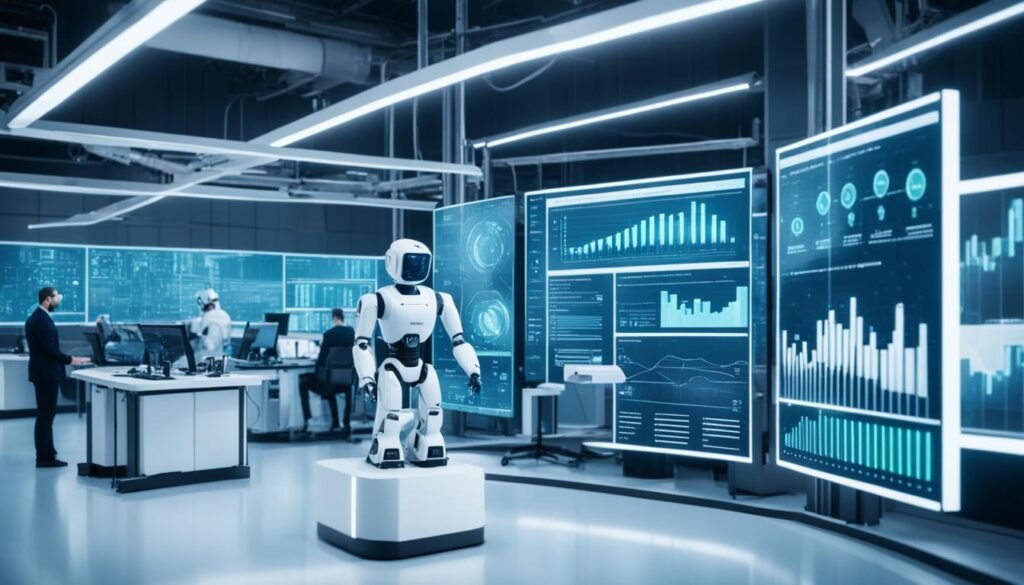
The Evolving Workforce Landscape
AI is changing industries, so businesses need to update their workforce plans. They’re using AI more to manage worker performance.
- 56% of businesses are using AI to improve and perfect business operations
- 51% are turning to AI to help with cybersecurity and fraud management
- 47% harness AI tools in the form of digital personal assistants
- 46% are using AI for customer relationship management
- 40% are turning to AI for inventory management
The long-term effect of AI on the workforce is still unclear. But one thing is sure: companies need to use the technology to stay competitive and make sure AI helps workers and the economy.
AI Transforming Industries
The use of artificial intelligence (AI) is changing many industries. It’s making a big impact in healthcare and finance. AI is bringing new efficiency and innovation to how businesses work.
AI in Healthcare
In healthcare, AI is changing how we spot and treat diseases. AI can look at medical images very accurately, helping catch diseases early. It also lets doctors keep an eye on patients from afar, making care better and more tailored to each person.
AI is speeding up finding new medicines and testing them out. It helps researchers find good candidates and make clinical trials better.
AI in Finance
The finance world has really taken to AI, especially for catching and stopping fraud. AI looks through lots of financial data to find anything fishy, keeping everyone safe from scams. It’s also changing the stock market by making trades super fast and in huge numbers.
Handling finance’s complex world needs a mix of different skills to make good investment plans. But, making these algorithms too complex can cause them to fail in real life. This shows why it’s key to work together and follow the rules when using AI and human skills together.
| Sector | AI Transformation | Key Applications |
|---|---|---|
| Healthcare | Improved disease diagnosis and treatment, remote patient monitoring, accelerated drug discovery | Medical imaging analysis, predictive analytics, virtual health assistants |
| Finance | Automated fraud detection and prevention, algorithmic trading, personalized financial services | Anomaly detection, trading algorithms, customer segmentation and personalization |
As more companies use AI, it’s changing how they work, improve customer experiences, and innovate. By adding AI to their plans, companies can find new chances and lead in a fast-changing world.
AI in Retail and Manufacturing
The retail and manufacturing sectors are changing fast with ai solutions. Artificial intelligence (AI) is making big changes. It’s making things more efficient, improving customer experiences, and making businesses run better.
In retail, artificial intelligence in industry is very useful. Stores use AI to manage stock better, talk to customers in a more personal way, and predict sales. AI chatbots help customers 24/7, and AI looks at data to suggest products that customers might like.
- Research shows AI brought in $40 billion more revenue for retail over three years.
- Brands that use AI for personalized experiences see a 6% to 10% revenue boost. This is two to three times faster than those who don’t.
- Retailers using AI see better demand forecasting, more personalized customer experiences, and better operations.
- Amazon uses AI to suggest products based on what customers have bought before and what others like them have bought.
In manufacturing, AI is changing things by making maintenance predictive, improving quality control, optimizing supply chains, and using robots for production. AI can spot equipment problems before they happen. It can also find defects and cut down on waste.
“Retailers using AI can better engage and succeed with customers by using data and trends.”
Companies like Tractor Supply and H&M are seeing the benefits of business ai solutions. As more businesses use artificial intelligence in industry, they’ll keep making things better, improving customer experiences, and finding new ways to innovate with ai-powered business processes.
AI in Transportation and Education
Artificial intelligence (AI) is changing many industries, including transportation and education. It’s making how we move, learn, and interact with the world better.
AI’s Impact on Transportation
In transportation, AI is changing how we navigate and manage traffic. Autonomous vehicles are leading the way to fewer accidents and better traffic flow. AI uses real-time data to predict traffic and optimize routes, reducing congestion.
AI is also improving maintenance, logistics, and supply chain in transportation. Computer vision technology helps spot road problems, check infrastructure, and find potholes. This means faster repairs and saves time and money.
AI in Education
In education, AI is making learning more tailored, efficient, and effective. Intelligent tutoring systems offer customized learning paths and adjust to each student’s needs. They provide feedback in real-time, helping students learn at their own speed.
AI-driven natural language processing chatbots give students personalized help and answer questions. Adaptive assessments use AI to check student progress and adjust future learning plans.
| AI in Transportation | AI in Education |
|---|---|
|
|
As AI grows, its effects on transportation and education will too. These advances in artificial intelligence in industry, corporate ai adoption, ai-driven business strategies, and enterprise ai implementation will change how we move, learn, and interact with the world.
“AI is not just a technology, it’s a way of thinking and a powerful tool that can transform industries and revolutionize the way we live, work, and learn.”
Conclusion
The AI revolution is changing many industries. We need to use these technologies wisely and manage their risks. Starting to use AI in our economy and society is just the beginning. How we handle it will affect its impact.
Companies that use how ai used in business and ai business applications will lead in innovation, efficiency, and growth. This is true for the future.
AI for enterprises and business ai solutions show us a future where AI changes how we work and live. It can make customer experiences better and help with making decisions. As more companies use these technologies, we see the big changes they can bring.
We need to find a balance with AI. We must focus on its benefits and solve its challenges. By creating ethical rules, training workers, and working together, we can make sure AI makes our future better for everyone.
FAQ
What is AI and how is it used in business?
AI stands for computer software that acts like a human, learning, planning, and solving problems. In business, it’s used for machine learning and deep learning. These help with big data, finding patterns, and making choices.
How is machine learning different from deep learning?
Machine learning uses algorithms that learn from more data over time. Deep learning is a type of machine learning. It uses artificial neural networks for complex tasks like spotting fraud.
How does AI support business decision-making?
AI takes data and shows possible actions to users. It helps in making business decisions by analyzing data quickly. This is faster than a human brain.
What are some examples of how AI is transforming business operations?
AI is changing customer service, cybersecurity, data search, and digital assistants. It automates tasks, personalizes experiences, and offers real-time insights.
How is AI impacting the workforce?
Some worry AI and automation will take jobs, but the effect is still unclear. Companies need to use AI to stay ahead. They also need to think about the workers’ future.
In which industries is AI making the biggest impact?
AI is changing healthcare, finance, retail, manufacturing, transportation, and education. It’s making things like diagnosis, catching fraud, managing stock, checking quality, and learning more personal.
